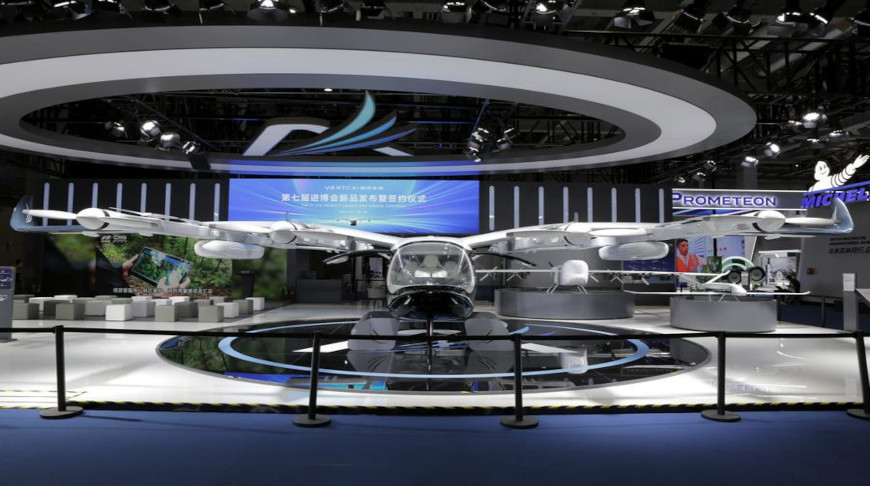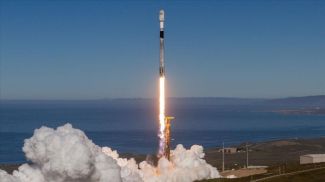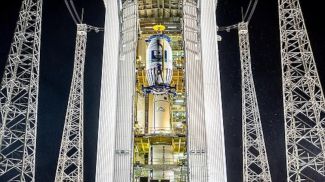
SHANGHAI, 6 November (BelTA - Xinhua) - With the seventh China
International Import Expo (CIIE) in full swing in Shanghai, global
companies are unveiling their latest technological innovations,
capitalizing on the opportunities arising from China's commitment to
further opening up both its market and manufacturing industry.
GE Healthcare, a regular exhibitor at the CIIE, has brought an unprecedented lineup to Shanghai this year. The U.S. medical technology company is showcasing multiple products either making their global or Chinese debut.
Eyeing China's growing demand for advanced medical technology, GE Healthcare is exhibiting its largest collection of new products ever at this year's expo, where it has been participating since 2018, said Zhong Luyin, the company's China communications executive.
"Our goal extends beyond mere participation in the expo. More importantly, we look forward to engaging in China," Zhong said.
A STAGE FOR ALL
At the ongoing CIIE, over 400 new products, technologies and services from around the world are being showcased, spanning sectors such as artificial intelligence, new materials, autonomous systems and energy transition technologies.
During a meeting on Monday with select exhibitors and buyers attending the expo, Chinese Premier Li Qiang said that China is able to sustain steady economic recovery, improve the quality and capacity of its market, and provide more extensive growth space for global businesses in terms of trade, investment and innovation. He added that the Chinese market is still one of the best choices for companies worldwide.
Just days ago, China removed all market access restrictions for foreign investors in the manufacturing sector, with the country's new edition of its national negative list for foreign investment having taken effect on Nov. 1. This significant move marked the latest effort of the world's second-largest economy to open its doors even wider.
"Benefiting from the 'spillover effect' of the expo, many of our showcased products are now in use across Chinese hospitals," said Lu Yi, MRI marketing manager of Siemens Healthineers. At this year's CIIE, the German medical technology company is unveiling the MAGNETOM Terra.X, its latest generation of magnetic resonance imaging (MRI) equipment -- the first time this new equipment is being displayed in Asia.
Lu revealed that Siemens Healthineers is advancing its localization strategy for cutting-edge product manufacturing. Notably, the MAGNETOM Terra.X is slated for future production at the company's base in Shenzhen, south China's Guangdong Province.
Apart from traditional technological sectors, the ongoing expo showcases an array of futuristic exhibits that seem straight out of the world of science fiction, including tires designed for lunar exploration vehicles, electric vertical takeoff and landing (eVTOL) aircraft, and innovative motor-powered shoes.
French tire maker Michelin, which is attending the expo for a fourth year, is exhibiting a futuristic prototype wheel for lunar exploration vehicles, among other products including car tires containing 71 percent sustainable materials and a new generation aircraft tire.
Serge Godefroid, research and development director of Michelin China, said Michelin has been innovating for the future of mobility and is even thinking about mobility beyond the Earth for future lunar or Mars exploration projects.
Michelin is already extensively testing tires in very rough conditions and with exposure to the range of temperatures that exist on the moon, Godefroid said. "You don't have somebody to help you inflate a tire on the moon, so you need to find a wheel that can sustain very difficult conditions."
RISING INNOVATION LANDSCAPE
A number of eVTOL aircraft are proving eye-catching at this year's CIIE. Vertaxi, an eVTOL startup which is attending the expo jointly with Ampaire, a global leader in hybrid electric aircraft systems, has brought three autonomous eVTOL drones to the 2024 expo.
Yue Tingting, vice president of Vertaxi, said the company's smaller eVTOL aircraft have been well received by the market and are being widely used for police, emergency and fire-fighting patrols, public and oil infrastructure inspections, and island logistics.
Yue admitted that it will take longer for the company's eVTOL aircraft to obtain the airworthiness certification needed for passenger transport. She, however, is very bullish about China's low-altitude economy and even envisions a future where people will be able to board eVTOL aircraft for daily commuting, much like taking a taxi or bus.
Shift Robotics, attending the expo for the first time, is exhibiting its new generation of motor-powered shoes, called Moonwalkers Aero, that allow people to walk at speeds of up to 11 km per hour.
Moonwalkers deliver smooth power when people who wear them speed up, while they offer very little assistance if the person wearing them walks very slowly. These motor-powered shoes can be used in virtually any environment, even on the subway, in a lift or on stairs, and people can move around in these Moonwalkers without taking off their normal shoes, according to Zhang Xunjie, CEO of Shift Robotics.
From industry giants to rising startups, the dedication shown to China by global tech companies is well-timed, as the country's prominence in the global innovation landscape continues to increase. According to the Global Innovation Index 2024 released by the World Intellectual Property Organization, China has moved up one spot to 11th place in the latest rankings of the world's most innovative economies -- becoming one of the fastest risers over the past decade.
"China's growth pattern has shifted from quantity-oriented to quality-oriented," said Tetsuro Homma, executive vice president of Panasonic Holdings Corporation. "To keep pace with this change, we are setting up more research and development teams in China to quickly adapt to the evolving Chinese market."
Over the past four years, this Japanese manufacturing company has steadily expanded its investment in China. Home to over 60 Panasonic subsidiaries, China now accounts for nearly a quarter of the company's business worldwide. "We are innovating for China, and we aspire to innovate in China for the whole world," Homma said.
GE Healthcare, a regular exhibitor at the CIIE, has brought an unprecedented lineup to Shanghai this year. The U.S. medical technology company is showcasing multiple products either making their global or Chinese debut.
Eyeing China's growing demand for advanced medical technology, GE Healthcare is exhibiting its largest collection of new products ever at this year's expo, where it has been participating since 2018, said Zhong Luyin, the company's China communications executive.
"Our goal extends beyond mere participation in the expo. More importantly, we look forward to engaging in China," Zhong said.
A STAGE FOR ALL
At the ongoing CIIE, over 400 new products, technologies and services from around the world are being showcased, spanning sectors such as artificial intelligence, new materials, autonomous systems and energy transition technologies.
During a meeting on Monday with select exhibitors and buyers attending the expo, Chinese Premier Li Qiang said that China is able to sustain steady economic recovery, improve the quality and capacity of its market, and provide more extensive growth space for global businesses in terms of trade, investment and innovation. He added that the Chinese market is still one of the best choices for companies worldwide.
Just days ago, China removed all market access restrictions for foreign investors in the manufacturing sector, with the country's new edition of its national negative list for foreign investment having taken effect on Nov. 1. This significant move marked the latest effort of the world's second-largest economy to open its doors even wider.
"Benefiting from the 'spillover effect' of the expo, many of our showcased products are now in use across Chinese hospitals," said Lu Yi, MRI marketing manager of Siemens Healthineers. At this year's CIIE, the German medical technology company is unveiling the MAGNETOM Terra.X, its latest generation of magnetic resonance imaging (MRI) equipment -- the first time this new equipment is being displayed in Asia.
Lu revealed that Siemens Healthineers is advancing its localization strategy for cutting-edge product manufacturing. Notably, the MAGNETOM Terra.X is slated for future production at the company's base in Shenzhen, south China's Guangdong Province.
Apart from traditional technological sectors, the ongoing expo showcases an array of futuristic exhibits that seem straight out of the world of science fiction, including tires designed for lunar exploration vehicles, electric vertical takeoff and landing (eVTOL) aircraft, and innovative motor-powered shoes.
French tire maker Michelin, which is attending the expo for a fourth year, is exhibiting a futuristic prototype wheel for lunar exploration vehicles, among other products including car tires containing 71 percent sustainable materials and a new generation aircraft tire.
Serge Godefroid, research and development director of Michelin China, said Michelin has been innovating for the future of mobility and is even thinking about mobility beyond the Earth for future lunar or Mars exploration projects.
Michelin is already extensively testing tires in very rough conditions and with exposure to the range of temperatures that exist on the moon, Godefroid said. "You don't have somebody to help you inflate a tire on the moon, so you need to find a wheel that can sustain very difficult conditions."
RISING INNOVATION LANDSCAPE
A number of eVTOL aircraft are proving eye-catching at this year's CIIE. Vertaxi, an eVTOL startup which is attending the expo jointly with Ampaire, a global leader in hybrid electric aircraft systems, has brought three autonomous eVTOL drones to the 2024 expo.
Yue Tingting, vice president of Vertaxi, said the company's smaller eVTOL aircraft have been well received by the market and are being widely used for police, emergency and fire-fighting patrols, public and oil infrastructure inspections, and island logistics.
Yue admitted that it will take longer for the company's eVTOL aircraft to obtain the airworthiness certification needed for passenger transport. She, however, is very bullish about China's low-altitude economy and even envisions a future where people will be able to board eVTOL aircraft for daily commuting, much like taking a taxi or bus.
Shift Robotics, attending the expo for the first time, is exhibiting its new generation of motor-powered shoes, called Moonwalkers Aero, that allow people to walk at speeds of up to 11 km per hour.
Moonwalkers deliver smooth power when people who wear them speed up, while they offer very little assistance if the person wearing them walks very slowly. These motor-powered shoes can be used in virtually any environment, even on the subway, in a lift or on stairs, and people can move around in these Moonwalkers without taking off their normal shoes, according to Zhang Xunjie, CEO of Shift Robotics.
From industry giants to rising startups, the dedication shown to China by global tech companies is well-timed, as the country's prominence in the global innovation landscape continues to increase. According to the Global Innovation Index 2024 released by the World Intellectual Property Organization, China has moved up one spot to 11th place in the latest rankings of the world's most innovative economies -- becoming one of the fastest risers over the past decade.
"China's growth pattern has shifted from quantity-oriented to quality-oriented," said Tetsuro Homma, executive vice president of Panasonic Holdings Corporation. "To keep pace with this change, we are setting up more research and development teams in China to quickly adapt to the evolving Chinese market."
Over the past four years, this Japanese manufacturing company has steadily expanded its investment in China. Home to over 60 Panasonic subsidiaries, China now accounts for nearly a quarter of the company's business worldwide. "We are innovating for China, and we aspire to innovate in China for the whole world," Homma said.













